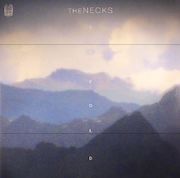Australian trio The Necks exist in a nebulous, spectral realm at the crossroads between free improv, jazz and a deconstructed form of rock’n’roll that is most remarkable because, like their neighbours (of hundreds of miles away in New Zealand) The Dead C, they do so in a way that is instantly identifiable and constantly questing for new ideas.
Over their last few albums, such as Open and Vertigo (both essential listening), they’ve taken their concept to radical heights on album-length tracks that progress in minute detail and with surprising twists and turns throughout. On the aptly-named Unfold, however, they’ve gone in a different direction, coming up with four side-long pieces instead of the now-traditional one. It’s different, daring, and, fortunately for the trio’s fans, effective.
On Open and Vertigo, the single pieces evolved organically across several stages, with each instrument (drums, bass, piano) responding to the others and trading places in the limelight. The more compact nature of Unfold means that each track becomes a stylistic exercise in working through restrained conditions. ‘Rise’, the opening track, evolves gradually, with keyboardist Chris Abrahams dominating on both piano and organ whilst Lloyd Swanton traces contemplative bowed drones on his bass and drummer Tony Buck opts for restraint, at least initially, with gentle silhouettes sketched out on cymbals and rattles. This is The Necks at their jazziest, with Abrahams adopting a crystalline tone that wouldn’t sound out of place on an ECM record (indeed, he sounds remarkably like a hybrid of Keith Jarrett and Colin Vallon, two of that label’s most expressive pianists). Despite the pristine nature of the piano, the presence of melancholic drones in the background combined with Buck’s uneasy polyrhythms imbues the piece with a certain dread factor and acute melancholy, the trio never settling into a comfortable emotional zone. As ‘Rise’ builds up its notes in increasingly dense flurries and clusters, The Necks conjure an almost spectral form of tension that never quite dissipates even as the album progresses in different directions.
In a startling volte-face, ‘Overhear’ sees Abrahams ditch the piano altogether in favour of what sounds like a Hammond organ beamed in from the 1960s. Swanton’s bass scrapes seesaw metronomically like a beating heart whilst Buck continues to favour bells, cymbals and minimal extra percussion over his full kit. Despite this, the drummer still acts as the trio’s driving force, the sheer weight of his presence embodied here by the constant, almost motorik, way he uses such minimal means to deliver a form of blunt force. In many ways, although a very different proposition, Unfold touches on a similar vein of insistent beauty that inhabited Tony Conrad and Faust’s Outside the Dream Syndicate. Maybe it’s the retro-sounding organ, which shimmers and seethes like it’s been extracted from a Santana or Iron Butterfly album recorded circa 1970 and displays Abrahams’ talents at their most virtuosic.
The album’s real centrepiece, despite the brilliance of ‘Rise’ and ‘Overhear’, however, is the colossal ‘Blue Mountain’ (and it’s not even the longest track on Unfold!). Again, Abrahams’ piano work is gentle and melancholic as he traces sumptuous lines in the air, but the track’s real strength comes from Buck’s frenetic snare rolls that seem to build and build without breaking free and the rumbling bass rumble from Swanton. Both lock into a groove both robust and ethereal, a cascade of sounds that swirls around Abrahams’ piano like it’s stuck in the heart of a storm. It’s why comparisons between The Necks and “post-rock” fall so wildly wide of the mark: no mere rock band could exert this level of control and tension without wanting to break out into solos to let in some air. The Necks, however, relish this constrictive groove, allowing it to force them to find new ways to express their unique talents. The symbiosis between the three is remarkable, with none dropping out and relinquishing his contributions through fatigue.
The longest track is closer ‘Timepiece’ (although the four sides of the album aren’t numbered, thus allowing listeners to explore Unfold from different perspectives) and it may be the least effective in many ways. Then again, it’s also the most abstract, owing a great deal to free improv and avant-garde jazz, with Tony Buck rattling away on the toms surrounded by a plethora of shuffling percussion noises (I’m assuming they’re overdubs, otherwise the drummer may be a perpetual motion device we should be using to save the world’s energy problems rather than enjoying his remarkable musical talents). Swanton here seems more restrained and less assertive, whilst Chris Abrahams, aside from contributing another organ-based backbone drone, limits himself somewhat to elusive swirls on piano that don’t always linger as much as they could. Having said that, ‘Timepiece’ is an exercise in sketching new possibilities, some of which might bear mightier fruit on later Necks releases.
With the thundering brilliance of ‘Blue Mountain’ and ‘Rise’ and the rhythmic psychedelic minimalism of ‘Overhear’, Unfold displays The Necks at their jazziest and most experimental, almost paradoxically given that they have less room to experiment on four shorter pieces than on the long single ones they’ve accustomed us to. As ever with the Australians, the musicianship is never short of wondrous, and they’ve used the new format to take their music into esoteric and mysterious realms. Not just are the results musically brilliant, they resonate with an emotional force that is too often absent in this sort of music.


